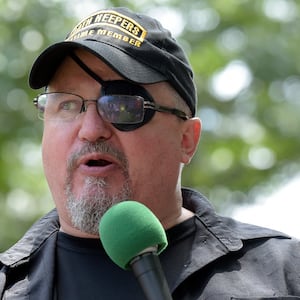Far-right militia leader Stewart Rhodes on Friday was ordered detained pending his trial on seditious conspiracy charges over his alleged participation in the Jan. 6, 2021 riot at the U.S. Capitol.
In late January, a Texas magistrate ordered Rhodes, a Yale-educated lawyer and former paratrooper who founded the Oath Keepers in 2009, to be jailed until his case is heard in court.
Today, a federal judge agreed, deciding Rhodes was too dangerous to set free.
“I am the first to recognize that there are expansive protections under the First Amendment for speech,” U.S. District Judge Amit P. Mehta said before handing down his ruling. “I’m well aware that even advocating for violence by itself is not unlawful, it is actually protected speech [unless it is calling] for imminent action. But Mr. Rhodes is not being accused of just speaking.”
Mehta went on, “Anybody who thinks this is about speech, they are mistaken. It is about speech and how that bears on Mr Rhodes state of mind and any objective he had on January 6th and after.”
There has also “been the suggestion” by Rhodes’ lawyers that Rhodes, who prosecutors say “spearheaded” the conspiracy with which he is charged, is “no longer a danger…now that President Trump is out of office.”
This, Mehta said, is not so.
In fact, as The Daily Beast reported, Rhodes continued to call for the overthrow of the U.S. government after the failed pro-Trump insurrection more than a year ago. He was arrested by federal agents in the Dallas area on Jan. 13, 2022.
Rhodes’ attorneys had suggested he could stay with a cousin named Kyla in California, without access to wifi or other methods of communicating covertly with other extremists. There are two houses on the property, one in which Kyla and her husband live and one in which Kyla’s parents live. Rhodes would stay with the parents, according to the defense.
Mehta said he would be open to such a setup, but wanted to ensure that Rhodes would not be spending time around members of the far-right community who could assist him with any subversive plans. However, after receiving more information, pretrial services officials had issues with the arrangement, and called for a private sidebar on Friday with Mehta that was off-limits to the media. Although Kyla’s last name was not made public, extremism researcher JJ McNab reported that her mother is the daughter of one of the most notorious “sovereign citizens” in history.
Prosecutors had argued earlier this week that the political situation in this country “hasn’t changed that much” since Jan. 6, and that Rhodes has the resources to act on his plans to depose “an illegitimate regime,” which is how he allegedly described the Biden administration in messages reviewed by the FBI.
The prosecution also noted that a “significant portion” of the alleged plot led by Rhodes “included the presence of an armed quick reaction force standing by not far away with an arsenal of weapons, ready to [put] those weapons into the hands of co-conspirators on the ground at a moment’s notice.”
In addition to the risks prosecutors say Rhodes poses to democracy itself, Assistant U.S. Attorney Kathryn Rakoczy argued in court previously that Rhodes’ “conduct in this conspiracy” suggests he poses “a grave danger” to the community if he were to be released.
Rhodes has been transient for the past year, and maintains multiple storage units that the government has not yet been able to identify, said prosecutors. He also “has a broad network of followers…whom the government is concerned he could rely upon or implore upon if he were so inclined, and that those individuals may be able to assist him with access either to technology or to firearms.”
Rhodes’ attorneys claimed he never ordered any of the Oath Keepers to actually enter the Capitol building—which they did. Prosecutors responded by saying that there is “obviously significant incentive and bias on [Rhodes’] part to not acknowledge that fact.”
In a Signal chat with other Oath Keepers leaders on Jan. 6, Rhodes allegedly wrote, “Hey, the founding generation stormed the governors [sic] mansion in MA and tarred and feathered his tax collectors. And they seized and dumped tea in [the] water. They didn't fire on them, but they street fought. That's where we are now. Next comes our ‘Lexington.’”
Those charged in the conspiracy all played an active role in committing the alleged crimes, and Rhodes was “the architect,” said prosecutors.
Rhodes’ defense lawyers, James Lee Bright and Jonathan Moseley, said they “disagree with an enormous amount” in the government’s case, saying that the evidence does not amount to a “conspiracy to overthrow the government,” but rather, “an enormous amount of bombastic language.” Besides, they argued, Rhodes never “activated” the quick reaction forces—or as Rhodes’ lawyers called them, “QRFs”—on Jan. 6.
“His face has been plastered” all over the media, Bright said in court, insisting, “There’s no way this man could—he isn’t even capable of flying and getting a ticket without having to be interviewed by DHS in advance of being given that ticket.”
Rhodes’ attorneys on Friday argued to have Rhodes jailed in D.C., where they are located, as opposed to in an Oklahoma lockup, where he has been housed.
Prosecutors said they do not want Rhodes to be held among other Jan. 6 defendants, but were not against a move in principle.
Mehta said Rhodes will be treated just like all the other Jan. 6 defendants and will not receive any “favorable treatment,” in justifying his decision to keep Rhodes where he is, saying he would consider the issue.
Rhodes is due back in court on March 4.






